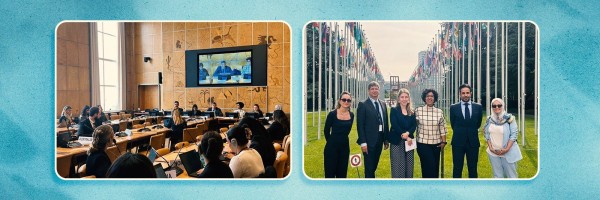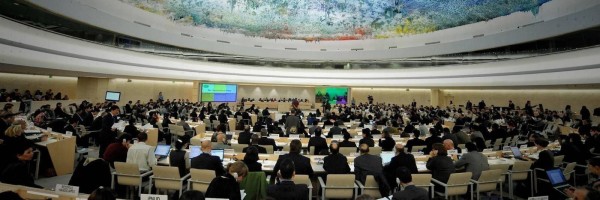Saudi Arabia’s bid to host the 2034 FIFA men’s World Cup falls far short of the global footballing body’s own minimum human rights standards, and leaves the field wide open to the risk of violations of civil and labour rights, according to a briefing released today, 5 December 2024, by ALQST for Human Rights. When FIFA takes its final decision on the bid on 11 December, it must demand major changes and credible guarantees that rights will be protected, or else reject it and make alternative arrangements.
ALQST’s 23-page briefing, An Open Field for Violations: Saudi Arabia’s 2034 FIFA World Cup bid, unpacks Saudi Arabia’s Bid Book and accompanying Human Rights Strategy for the World Cup, as well as the “Independent Context Assessment” on human rights carried out by Riyadh-based law firm AS&H Clifford Chance. It finds that serious shortcomings in the bid documentation point to a real risk of widescale violations, from labour exploitation and forced displacement to restrictions on fundamental freedoms and discriminatory abuse.
On 29 November, FIFA published its own evaluation of the bid. Mirroring the same fundamental flaws found in the bid itself, the FIFA report substantially minimises the potential human rights risks associated with the tournament, giving Saudi Arabia a “medium” human rights risk rating overall and determining that the bid “qualifies” for consideration, effectively nodding it through unchallenged.
So far, neither FIFA nor the Saudi Arabian Football Federation (SAFF), which prepared the bid, have paid more than lip service to the requirement for stakeholder engagement in the bidding process: the Saudi public have not been allowed to have their say. In this and numerous other ways, awarding the event to Saudi Arabia as it stands would violate FIFA’s own policies and procedures, while lending Saudi Arabia’s harshly repressive authorities a spurious legitimacy and licence to double down on their notorious abuses.
ALQST’s Head of Monitoring and Advocacy, Lina Alhathloul commented: “Football is massively popular with Saudi Arabia’s youthful population, and there’s no doubt that the authorities have the resources to host such a tournament. But, at present, the risks simply outweigh such arguments – risks to the safety and even lives of the hundreds of thousands of foreign workers who would build the stadiums and other infrastructure, and restrictions on the freedoms of visiting and local fans and journalists.”
Labour exploitation, arbitrary land grabs and other key concerns
The Saudi bid outlines extensive infrastructure plans, including 15 state-of-the-art stadiums across five host cities and associated training facilities, transport links and hotel accommodation. Given the prevalence of labour rights abuses in the country at present, under the abusive and only partly-reformed kafala sponsorship system, these plans present serious risks of labour exploitation and worker deaths on a massive scale. Detailed research conducted by ALQST in the run-up to the bidding process revealed abuses associated with arbitrary land seizures and the forcible displacement of residents already taking place in two of the main tournament venues, Neom and Jeddah Central. Nothing in the bid documentation rules out or credibly mitigates the risk of similar violations taking place elsewhere during construction of the proposed tournament infrastructure.
A further concern, which the bid likewise fails to address convincingly, relates to the Saudi authorities’ harsh restrictions and sweeping crackdowns on the fundamental freedoms of expression, assembly and association, including the criminalisation of human rights activity and journalistic work. FIFA’s own policies commit it to the protection of human rights defenders and upholding press freedom, both of which are routinely disregarded in Saudi Arabia. The country’s laws also allow systemic discrimination on the basis of gender, religion and sexual orientation, affecting citizens and residents directly and creating uncertainty for foreign visitors.
The authorities’ rampant use of the death penalty, with more than 300 executions having taken place in 2024 already, as well as the torture and ill-treatment of prisoners, again illustrate the climate of repression in the country and further underline Saudi Arabia’s unsuitability to host the tournament under the current conditions.
Lack of public consultation
Stakeholder engagement should be an essential component of plans for staging any mega-sporting event such as a World Cup, requiring full public and expert input. The prospect of this in Saudi Arabia is severely undermined by the authorities’ restrictions on fundamental rights, including the curtailing of civil society stakeholders who would ideally form a key part of the necessary consultation.
This makes it even more vital that FIFA engages with external stakeholders, yet the body and SAFF have barely acknowledged this requirement, and FIFA has ignored requests from human rights groups such as Amnesty International and ALQST to contribute to the consultation.
Awarding the World Cup to Saudi Arabia would shred FIFA’s own rights policies
Awarding the 2034 tournament to Saudi Arabia, on the basis of a bid that fails on so many counts to meet FIFA’s own policies and procedures, would leave the Federation’s claim to uphold human rights in tatters. That includes its own Human Rights Policy, in which it pledges to engage with host countries to minimise any adverse impacts on fundamental human rights.
FIFA is due to take a final decision on awarding hosting rights for the World Cup on 11 December 2024, with Saudi Arabia the sole bidder for the 2034 men’s tournament. Ahead of the vote, on 29 November, FIFA published its own evaluation of the bid. Although the evaluation appears to green-light the heavily flawed Saudi bid, on 11 December the FIFA Congress must demand major changes and credible guarantees that rights will be protected, or else reject it and seek to make alternative arrangements.




